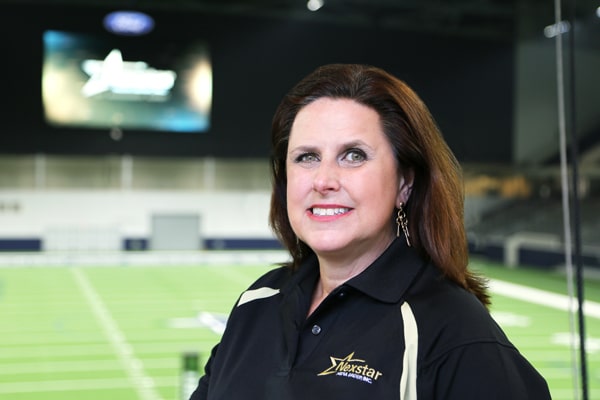|
Getting your Trinity Audio player ready... |
The end of Nexstar Media Group’s 2019 marked the close of another major chapter in the company’s growth. With its nearly $7 billion acquisition of Tribune Media Company, Nexstar added more than twenty million viewers to become the largest US television company.
The acquisition plan also included a number of divestitures to comply with Federal Communications Commission (FCC) regulations. It was a deal that made headlines and was reviewed under considerable FCC scrutiny before being greenlit. And in the middle of it all was Elizabeth Ryder, who still isn’t sure just how she wound up teeing up one of most widely discussed deals of the year.
“I started out as the sole attorney for the company,” says Ryder, who is in her eleventh year at Nexstar. “They had never had a general counsel before.” When Ryder joined, Nexstar owned or serviced 52 stations. That number now stands at 196 stations (owned or serviced) in 114 markets in 38 states. “I remember when a lease dispute at one of our stations seemed like a complicated issue. And now I just have to pass it off to someone else to deal with because of the magnitude of the deals we’ve been working on.”

With the integration of the Tribune Media Company, Ryder says Nexstar is focused on strategies to better monetize its new and news assets. “We’ll be in something like sixty million television households and a lot of people in those markets also visit our websites,” Ryder explains. “So we’re doing a lot of work on how we can monetize that information and help our advertisers reach the target audience that they want.”
The Tribune acquisition has also included the addition of select attorneys from the organization integrating into the Nexstar legal team. “They’ve been an invaluable addition and have brought a plethora of experiences with the stations,” Ryder says. “Their working knowledge of the broadcast industry really helps balance the workload here and keep us all sane.”
During her own twenty-four years of practice, Ryder has evolved from an attorney who was only casually aware of FCC rules and regulations to needing to understand the nuts and bolts of the organization’s operating procedures at the most formative levels.
The legal department has established core principles and policies—such as the legalities of marijuana advertising in certain markets, sports gambling, and the litany of FCC compliance obligations—and made those widely available.
“The answer to FCC questions doesn’t change whether you’re in Sacramento, California, or Panama City, Florida,” Ryder says. “Having access to those materials via the company intranet makes it so people don’t have to necessarily wait for an answer from the legal department. That standardization is probably one of the best things we ever decided to do.”
Those standards and best practices were thrown a considerable curve ball by COVID-19. While Ryder’s legal team was able to transition into working from home with relative ease, Nexstar’s operation with essential designation in thirty-eight states does make for some extremely tricky operational considerations. “It’s been very different state-by-state,” Ryder explains in her July 2020 interview. “New York took a very different approach than Texas, and it’s been important for our SVP of human resources (who also is an attorney) to keep up with all of the changes occurring in all the states we operate in.”
“The answer to FCC questions doesn’t change whether you’re in Sacramento, California or Panama City, Florida.”
The pandemic hit the sports industry particularly hard and virtually wiped out stations’ broadcasts of NFL preseason football games, among others. With the continuing cancellation of entire sports seasons, a fair amount of programming ingenuity and troubleshooting will occur at stations across the country.
Ryder says in these times, especially, it’s been important for her to continue to delegate, a tough proposition for a self-described “control freak.” “Letting my staff do their work without interfering is one of the hardest things I’ve ever had to do,” Ryder admits. “But I have hired good people who I trust to do their jobs. And we’ve gotten so big that I just need to trust and not worry so much.”
Her husband noticed that outside of the office, Ryder seemed so much less worry-prone when they would take vacations that included relaxing near the water. He took it so much to heart that upon returning home from a trip, they bought a small boat, so she can “be the much sunnier version of myself.”
Ryder still expresses wonder at what she’s helped Nexstar accomplish in just a single year, let alone the last eleven. “This has been an incredible ride, and I feel very fortunate and blessed,” Ryder says. “I had a different career before I even decided to go to law school, so it’s just kind of a wonder to find myself in the middle of a multibillion-dollar transaction.”
Ryder’s accomplishments don’t go unnoticed by external partners. “As Nexstar Media Group’s top in-house lawyer, Elizabeth has guided the company through a period defined by remarkable growth and innovation,” says Jennifer Selendy, managing partner at Selendy & Gay. “Fusing deep industry expertise and a strong, practical decision-making, Elizabeth is leading Nexstar to new heights.”
While the staggering acquisition of the past year prevents Nexstar from purchasing any more television stations in the near future, per FCC rules, Ryder says the company’s already mammoth portfolio offers endless opportunities for new challenges and new audiences in the ever-changing media landscape.

